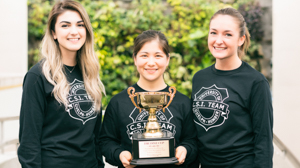
Students from the Justice Studies program at the University of Guelph-Humber won the top honours at the annual CSI competitions at Mount St. Mary's University in Maryland.
Recent UofGH graduates Connor Cantwell, Jason Westerman and Alex Corfield collected the first prize and brought back a trophy as well as bragging rights.
UofGH students also clinched the second, third, fourth and eighth spots.
"What we were taught in the classroom really paid off," Cantwell said. "This really hit home at the awards ceremony when Guelph-Humber's name kept coming up again and again. It was confidence-boosting to know we were able to apply the high-calibre education and mentorship we received from our instructors outside the classroom as well."
The Crime Scene Investigation-styled competitions annually typically attract 17 to 20 teams from the U.S. and Canada. Guelph-Humber was the sole Canadian university to compete this year.
The UofGH edge
University of Guelph-Humber instructors Dr. Glenn Barenthin and John Irwin — who accompanied the participants to Maryland — said students are in charge of selecting contestants and preparing them for the challenge each year. This year's selection committee included UofGH students Bianca Caputo, Emma Kelly and Connor Nicklin. The trio conducted gruelling interviews and shortlisted individuals.
"The feedback we heard from the judges was that our students are professional and know exactly what to do," said Dr. Barenthin, a former veteran police officer. "I have to commend all the students involved; those who participated as well as those who selected and coached the team. It was all because of their hard work and dedication."
Irwin, a retired police officer with more than three decades of experience under his belt, agreed. He said planning for the CSI competition is an excellent way for the students to develop their leadership skills and put into practice concepts they learn.
"This (competition) is a capstone for many students," Irwin said. "In the class, we teach the course from the angle of an investigator. The CSI competition is like a real-world scenario and all of the steps the students did there, an actual police officer would probably do in an actual investigation."
So, you think you can solve this case?
Students had 45 minutes to study a fake crime scene, take photographs, collect evidence, and determine which items needed to be processed. They also had to interview witnesses and present a report based on the weight of forensics and proof.
A team of judges — members of the law enforcement and detectives from the local police force — evaluated the teams based on their understanding of forensics, handling of the evidence and their inference of the case.
This year's scenario was a homicide of a disabled individual. All evidence initially pointed towards suicide, said Cantwell, who along with his team dug deep, collected a bullet and other items from the crime scene, and questioned witnesses.
During the course of talking to witnesses, the students found out earlier that day, the victim had an intense argument with his caregiver over the contents of his will. This major piece of information helped them unravel the crime.
Judges evaluated the teams based on how they handled evidence and interpreted and supported the claims.
"A key part of the competition was teamwork," Cantwell explained. "I was confident I could rely on my teammates to take reliable photos, draw sketches and take accurate witness statements. We all worked so well that by the time I had finished processing the scene, the others had their reports and observations ready. So, we were able to come together and figure out the crime."







